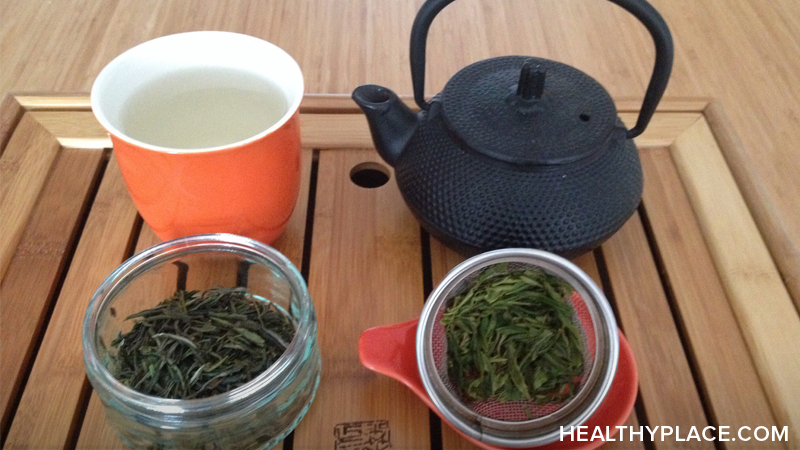Patti's Panic Place
I always remember being anxious. Growing up, everyone would simply say, "you are just a nervous child." So life went on. 
I was raised, as many, in a "dysfunctional" family. I had scary thoughts and bad dreams. My father's alcoholism created chaos and additional feelings of insecurities. As a teenager, I suffered from eating disorders, bleeding stomach ulcer, irritable bowel problems. I began avoiding situations where I could not come and go as I pleased; situations where I couldn't be in control. High school was extremely hard. I was absent a lot and I became very good at making excuses.
By age nineteen, I was out on my own, controlling my anxious feelings with alcohol. I learned to cope with everyday situations, working and socializing, by drinking.
I was working in a disco, when I was 21 and met my first husband, David. I got married, had my first daughter, Lindsey, and moved into my home.
The marriage was not a good one. My husband was very irresponsible and didn't like the "tied down" feelings of being married and being a father. I was very insecure. David lost it one night and punched me once and I ended up in the hospital with a fractured nose. I had to have plastic surgery to replace the bones in my nose. We divorced when I was 26.
As a single mother I felt more insecure than ever before. Not only did I have myself to deal with, but I had a child. I was scared and lost.
My World Becomes Smaller:
By this time in my life, I started to avoid more-and-more places. I would wake up in the morning and get Lindsey up and go to my parents. I only went places with my mom. I'd go to the store and begin to feel dizzy and would leave and go sit in the car. I stayed at my parent's house all day and, reluctantly, would come home at night.
I increasingly started feeling more out of control. I had my first full-blown panic attack while shopping for asparagus with my parents and my daughter. I was in the car and all of a sudden I felt this overwhelming urge to find my parents and leave. When I got home, I felt better.
At this point, I stopped going to my parent's house. I stayed home and for a period of time. I didn't even leave my bedroom. My mom would come to my house and pick-up Lindsey and take her to her house. I was so alone and frightened.
I saw programs about panic disorder. I listened intently. They were describing what happened to me. There was a name for what I had: "Agoraphobia".
 However, I soon discovered that knowing about the disorder didn't make it go away. And since I didn't know where to turn for help, things didn't get any better. I found doctors that prescribed a variety of tranquilizers, but they made things worse. As a result, I decided to live with the anxiety rather than the zombie fog of the tranquilizers.
However, I soon discovered that knowing about the disorder didn't make it go away. And since I didn't know where to turn for help, things didn't get any better. I found doctors that prescribed a variety of tranquilizers, but they made things worse. As a result, I decided to live with the anxiety rather than the zombie fog of the tranquilizers.
Then I met my second husband, Clay. He was a very needy person. Since I couldn't help myself, helping him was my new project. It kept my mind off my problem.
I got pregnant with my second child. Now being completely housebound, I searched for a way to have my baby without leaving the house. I found a midwife and she came to the house for pre-natal visits.
We planned for a home birth. It didn't happen that way. Problems arose with the pregnancy. I had to go the hospital to try and have the baby turned. It didn't work. On the way home, I went into labor and my water broke. The ambulance was called, the babies heart wasn't beating, I had a prolapsed cord. At the hospital, they did a emergency C-section and my daughter, Kaydee, was born. It was a miracle, she was in the intensive care unit for sometime. She was premature, but healthy. Thank-GOD. I wasn't in very good shape, physically or mentally. I wanted out of the hospital, NOW!.
I came home with my new baby. Clay was sinking into drugs and alcohol. He was a very controlling, physically abusive man. He actually found pleasure in the fact that I was agoraphobic. The situation worsened, the arguments, constant upheaval, beatings-- my life was at the lowest point.
My daughters were suffering. Lindsey was a teenager and resented Clay and his sickness. I was losing her. Kaydee was scared and didn't understand what was going on. Things had to change. But how?
I got a computer for Lindsey, and soon found a library at my fingertips. I read everything I could find on panic disorders. I found support groups, other people to talk to. I wasn't alone anymore.
A New Beginning
At this point I had been on-line and reading everything I could get my hands on, finding out new information about PAD (panic anxiety disorder) with agoraphobia. I felt there was help out there for me, I just had to find it.
I sat down with the phone book and started getting phone numbers to therapists that specialized in PAD. I was really anxious and afraid to make the phone calls. What would I say? Would they think I was totally crazy? All these thoughts kept running through my head. I had to do this. I wanted out of this self-made prison I had built for myself.
I made the first phone call. I left messages and some returned my calls. I would explain how I was housebound and really needed someone to come to my house for the first visit. This is the point in the conversation where the therapist would usually say something to the effect of: "I don't make house calls." I felt so stupid and started slipping back into my old thoughts, that there was no help for me and I was being absurd for asking for a therapist to come to my house.
I was getting worse-and-worse. I couldn't sleep. I was waking in the middle of the night in a full-blown panic attack. I started making phone calls again. I had one therapist call me back and after explaining my situation to him, he said, "In the first place, I don't make house calls and I have a waiting list of people who want to come to my office to see me. How could I possibly come to your house!" "OH MY GOD," I thought, how awful for a therapist to say this. I thought "good thing I wasn't suicidal". At first, I felt like crawling in a hole, but then I thought, NO-WAY! I was actually moredetermined to find someone who understood.
The very next day, I got a phone call from another therapist. Once again, I explained. He started asking me questions. This was different. My heart started racing. He stopped and told me that he would think about it and call me back. I waited anxiously for his call. The phone rang, it was him, Dr. Cohn. He told me he had never come to anyone's house before (my heart sunk). I could hear his next words in my head, but then, to my surprise he said he was willing to come to my house!! I couldn't believe what he said. He said he would come. He set up a day and time for the appointment.
When the big day arrived, I was nervous and excited. I saw his car pull up. He was a tall, gray-haired man. He came in and smiled at me and introduced himself. I liked him already. He asked me a lot of questions, writing as we talked. He diagnosed me with extreme panic disorder plus agoraphobia.
He also asked about my family background, any other family members who suffered with any forms of PAD. I told him about my grandmother, who had committed suicide because of her problems with PAD and of my other family members with alcohol problems. He explained about the hereditary aspects of this disorder and chemical imbalances.
He wanted to start me on some medications. He told me to please take the medications as he prescribed and then explained how his patients were afraid of taking any medications. "He must be reading my mind," I thought. He talked about how the fear of taking medications is actually a symptom of PAD, how someone like me, is so in-tune with every little change in our body's reactions to anything that we won't take medications.
I felt reassured about the medication. I promised I would take them. He set up another appointment, in his office. He told me if I didn't feel like I could come, he would make one more visit to my house.
I started taking the medications. It wasn't easy. I was so afraid of putting anything inside my body, fearful of how it would make me feel. He started me out very slowly on low doses, increasing the dose in 5 days. I was on my way. I felt few side-effects from the medications.
The day came for my appointment. My daughter drove me to his office and there I was. Dr. Cohn gave me a big hug and we started talking. I had made it to his office. I felt like I had just ran a marathon and won. This was my first step back into my life.
My Angel
I met Sue, on a day that was like every other day, filled with loneliness and despair. She's the mother of Kaydee's (my daughter) friend, Whitney. Whitney came over to our house to play with my daughter. Sue came to pick her up. We started talking and Sue started to share with me her experiences with panic disorder. As I listened, I couldn't believe I was hearing that she too had suffered with this disorder. I was, to say the least, shocked to actually be hearing someone else had these symptoms I was having. I couldn't get enough. I was like a sponge, soaking up everything that came out of her mouth. I wasn't alone anymore. She knew. She understood. She wanted to help.
Sue started doing "Behavioral Therapy" with me. She would come over to my house and we started out with very small steps. First, she walked down to the corner of my street with me and then back. My legs shook, but I made it. I felt a great sense of confidence that night, something so small, but yet so important. The next time we walked to a park by my house. Sue held my arm and kept reassuring me I was okay, then she let go of my arm and walked ahead of me and then said, walk up to me. I remember telling her I couldn't. She said "Sure you can." I did and we walked further. Then we came home.
These were the first small steps, and how wonderful I felt, and how safe I felt with Sue. I practiced on my own and I noticed the panic feelings weren't there. I was totally amazed. It was working!!
Sue had everything planned out. I wouldn't know where or what we were doing next. The next things we did involved taking rides in Sue's van. She took me for a short drive the first time and it was so strange, like I had been in a coma for a very long time. How things had changed, streets, stores. With each new journey, I conquered another fear and built confidence.
I remember the first day Sue took me to Kaydee's (my daughter) school. It made me so happy to see where Kaydee was going to school. The first time in the grocery store, Sue came in with me. The next time we went, she parked and gave me a list and sent me in by myself. GEESH, was I nervous. I did it, I did it... YEAH
At this point, Sue decided it was time for me to go out on my own. This was really hard. She was my support and I didn't know if I could do it without her. Little-by-little I did, but I still missed her a lot.
Sue's family and I met for dinner a few times. It was really nice to go and do things like that. At this point, my husband was drinking and doing a lot of drugs. Finally one night, Clay went into a rage. He found out that I was going to my therapist without him. He thought I had been telling my therapist things about him and he got really mad. I told him that we needed to go for a ride because I wanted to get him away from the kids.
He lost it, Totally, and beat my head against the dashboard until I was unconscious and then threw me out of his truck, in front of my house. He called from his cell phone and told me he would be back with a big gun. Well, I called the police and they issued a warrant for his arrest. I was taken to the hospital, had a broken jaw and fractured arm. He did show up in the middle of the night, with a rifle and the police arrested him and he spent one night in jail. This was the beginning of more tests of my strength, I believe. I had to have many surgeries on my jaw, braces and pins, lots of physical therapy. After about a year of court dates, he spent 3 months in jail and is now on 5 years ISP probation. Our divorce was final in April of 98.
Sue and I still talk and visit, she will always be my Angel. I will be eternally grateful for her support, guidance and friendship.
My Life Now
It has been almost 3 years now since I started therapy. Many things have changed. I continue to see my therapist, but now our visits consist of different discussions. After one of my sessions, Dr. Cohn asked me if I would be willing to talk to a few of his patients. I did and little did I know this would be yet another journey. Now I do Cognitive Behavioral Therapy with patients of Dr. Cohn's. This has been such a rewarding experience for me. Being a part of their recovery inspires me so much. To see their strength and determination to fight this battle makes everything I went through totally worth it. Dr. Cohn told me that since agreeing to a house call for me, that he now will continue to do so if anyone asks.
I am now remarried to a unbelievable man, who has shown me what love, security and trust are really all about. He supports me in everything I do. I have truly been blessed.
My road to recovery was long, but not nearly as long as the years I did nothing and lived in fear. I challenged my fears. I had weekly appointments with my therapist. I did Cognitive Behavioral Therapy, relaxation exercises, breathing exercises, meditation and kept a journal of all of it. Recovery is a re-learning and re-training process. We need to learn coping techniques so that we can handle stressful situations in a different way than we did. So, I am going to explain the methods I used and continue to use. I hope they will help you too
next: Anxiety and Depression in Women
~ all articles on patti's panic place
~ anxiety-panic library articles
~ all anxiety disorders articles



 However, I soon discovered that knowing about the disorder didn't make it go away. And since I didn't know where to turn for help, things didn't get any better. I found doctors that prescribed a variety of tranquilizers, but they made things worse. As a result, I decided to live with the anxiety rather than the zombie fog of the tranquilizers.
However, I soon discovered that knowing about the disorder didn't make it go away. And since I didn't know where to turn for help, things didn't get any better. I found doctors that prescribed a variety of tranquilizers, but they made things worse. As a result, I decided to live with the anxiety rather than the zombie fog of the tranquilizers.